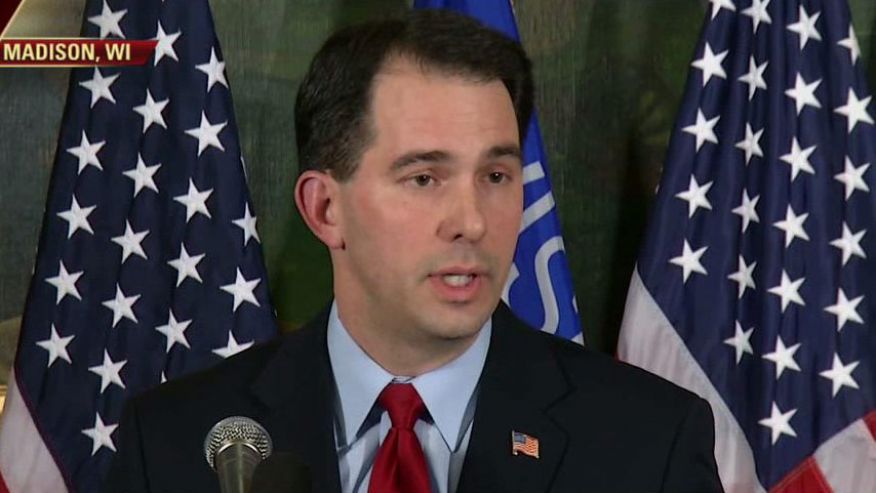As Wisconsin Gov. Scott Walker dropped out of the presidential race late Monday afternoon, his announcement created at least an $18 million vacuum, according to OpenSecrets.org.
The super PAC backing Walker, Unintimidated PAC, spent $1.8 million on independent expenditures before Walker bowed out. The group had raised $20 million by June 30, with the money coming in from some high-profile Republican donors who may have to decide, with their favored candidate out, who else they’ll throw their money behind.
Several major donors gave only to Walker’s super PAC this cycle: businesswoman Diane Hendricks, for one, gave Unintimidated $5 million. Richard and Elizabeth Uihlein gave $2.5 million combined. None of the three gave to other super PACs, making them free agents should they want to continue having an influence on the election.
The race will be on, however, for the Ricketts’ full support. While her husband Joe Ricketts gave Walker $100,000, Marlene Ricketts gave the Walker-backing super PAC $4.9 million.
The two did, however, signal who they like beyond Walker, and it’s a broad field: The Ricketts gave $10,000 each to the super PACs supporting New Jersey Gov. Chris Christie, former Florida Gov. Jeb Bush, Sens. Ted Cruz (R-Texas), Marco Rubio (R-Fla.) and Lindsey Graham (R-S.C.) and former Texas Gov. Rick Perry — whom Walker joins on the Republican cast-off heap.
Access Industries, a private industrial company based in New York City, gave Unintimidated PAC $1 million, but also graced the Graham-backing super PAC Security Is Strength with a $500,000 contribution.
It’s unclear how much Unintimidated PAC has in the bank now as it has continued to raise funds — but also to spend them. Earlier this month, the group announced a $16 million ad campaign to bolster Walker in the coming months. Only part of that has been spent so far, though. The super PAC ran an ad in Iowa and also sent mailers boosting Walker.
Walker announced his candidacy on July 13 and has not yet been required to file a report to the Federal Election Commission for his campaign, which formed two days after the mid-year reporting deadline for candidates who had already announced. That means the FEC has no data on Walker’s “hard money,” or direct contributions from individuals capped at $2,700. In Perry’s case, his difficulty when it came to raising money directly for his campaign served as a bellwether of his operation’s collapse — the super PACs supporting Perry raised nearly $13 million, while his campaign raised just over $1 million as of June 30 and apparently struggled since.
But that’s not to say Walker didn’t raise funds at all. The Campaign Legal Center filed a complaint with the FEC claiming Walker and others broke campaign finance law when they raised funds to “bankroll a formal presidential campaign” while supposedly just “testing the waters,” or scoping out a potential campaign, according to a Campaign Legal Center press release.
Walker raised that money through a political organization called Our American Revival, which shared several of Unintimidated PACs’ largest donors, including Uihlein and Access Industries, according to Bloomberg Politics.
Brianna Gurciullo contributed to this report.
Scott Walker’s Labor Plan Aims at Major Democratic Fundraising Source
By Brianna Gurciullo, OpenSecrets.org
Wisconsin Gov. Scott Walker’s labor plan, released this week, would do more than undermine unions on a nationwide scale: It would also hurt a multi-million-dollar source of campaign donations to Democrats.
While union membership across the country has shrunk, campaign contributions have risen. During the last presidential election cycle, labor gave $141.3 million to federal candidates, political parties and outside spending groups – almost double what the sector donated in 2008. Labor’s contributions were nearly as generous in the 2014 midterms, totaling $140.7 million.
Nearly all of labor’s 2012 donations to candidates and parties – 90 percent – went to Democrats, with President Barack Obama coming in as the biggest recipient at $618,000. But unions also gave hundreds of thousands of dollars to individual House and Senate candidates, with Sens. Tammy Baldwin (D-Wis.), Elizabeth Warren (D-Mass.) and Claire McCaskill (D-Mo.) ranking among the top draws for labor money that cycle.
Unions representing teachers, auto workers and public employees were the top donors: The National Education Association, the United Auto Workers Union and the American Federation of State, County and Municipal Employees each gave more than $10 million.
Walker’s plan would eviscerate the power of unions. The GOP presidential hopeful would abolish the National Labor Relations Board, which investigates allegations of unfair labor practices, and eliminate federal employee unions. Public sector unions, which include employees at all levels of government, donated $14.7 million to Democrats in 2014.
“Further, I will stand in solidarity with any governor, Republican or Democrat, who fights the big-government special interests in their state and takes on collective bargaining reform like I did in Wisconsin,” he wrote in his plan.
In 2011, Walker pushed a controversial bill to restrict collective bargaining for most of his state’s public employees. It passed despite protests at the capitol in Madison that drew nationwide news coverage. This year, he signed into law a bill to make Wisconsin the 25th “right-to-work” state – one in which workers can’t be compelled to join or pay dues to a union as a condition of employment, even if the union negotiates collective bargaining agreements that benefit them. Walker now hopes to pass a “right-to-work” law at the federal level that would require states to opt out of the policy if they disagree with it.
“Democrats and union bosses are panicking because I want to end the special treatment and taxpayer-funded giveaways they’ve benefited from for years, and they know I’ll deliver results for hardworking families no matter who stands in the way,” Walker said in a statement the day after releasing his plan.
Walker also would have the Department of Labor provide information about the costs of collective bargaining policies, and how much states would save if they changed them. And Walker said he’d require federal worker unions to publicly report what portion of membership dues they use for political activity.
David Cox Sr., the national president of the American Federation of Government Employees, said in a statement that prohibiting “federal employees from having their union dues voluntarily deducted from their paychecks, as Scott Walker has promised to do if elected president, is a blatant political attack on federal employees and an attempt to wipe labor unions off the map.” Union dues, he noted, are not used for political contributions, but for “negotiating better working conditions, protecting employees from discrimination and retaliation” at work, and other activities.
Contributions to candidates come mostly from the unions’ PACs, which are funded by donations from union employees and members separately from any dues they pay. And unions use large sums from their treasuries not to contribute to candidates, but to run their own ads on behalf of favored candidates or to contribute to other outside spending groups that do so.
The NEA, for instance, underwrote its own super PAC, the NEA Advocacy Fund, to the tune of $21.8 million in the 2014 cycle. That group in turn spent $5.8 million on ads benefiting Democratic candidates, including $3 million used for attacks on North Carolina’s Thom Tillis, who went on to win a Senate seat. The AFL-CIO, the umbrella organization for many labor unions, and some of its affiliate unions gave a total of about $18 million to the AFL-CIO Workers’ Voices PAC. That super PAC reported spending more than $2 million on ads attacking Republican candidates or supporting Democrats, including about $424,000 backing Sen. Mark Begich, the Alaska Democrat who lost his re-election effort.
Labor also gave $10.9 million and $15 million to House Majority PAC and Senate Majority PAC, respectively. They are the Democratic Party’s super PACs that support congressional candidates.
Losing those sources of support would be a “huge blow to Democrats,” said Norman Ornstein, a resident scholar at the American Enterprise Institute and a veteran observer of politics. “They’ve already suffered a huge blow from the attempts and successful efforts in Wisconsin and a number of other states to undercut public employee unions.”
Unions provide not only financial support for Democrats, Ornstein said, but also boots on the ground to do grassroots organizing – which has long rankled Republicans.
“[A] lot of the efforts we’ve seen in undercutting unions have been strongly focused on undercutting the Democratic Party’s political base,” Ornstein said. But Walker’s plan is “much, much broader,” wiping out the concept of unions and collective bargaining.
Ray La Raja, an associate professor of political science at the University of Massachusetts-Amherst, said Walker’s blueprint would make it more difficult – but not impossible – for unions to engage in politics.
“Unions will find ways to spend their other cash on politics if they can,” La Raja said.
Besides, while Walker’s plan “would have a dramatic impact” on Democrats, it’s unlikely to happen, said Kyle Kondik, the managing editor of Sabato’s Crystal Ball newsletter at the University of Virginia Center for Politics. Even if Walker were elected president, Republicans would need to overcome a Democratic filibuster in the Senate to extend “right to work” nationwide and end federal employee unions.
And Ornstein said he viewed the proposal as an example of a candidate throwing “radical Hail Mary passes to show he’s different.” Walker has slid in the polls while non-establishment candidates like Donald Trump and Ben Carson (and now, maybe, Carly Fiorina) dominate the field. But Ornstein doubted a focus on union issues would give Walker more traction.
Senior researcher Douglas Weber contributed to this story.





